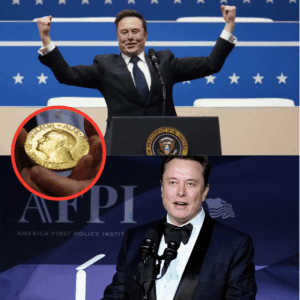Elon Musk Nominated for the Nobel Peace Prize: Discover the Astonishing Reasons Behind This Groundbreaking Honor and How His Visionary Work is Transforming Our World for the Better!

In a world often divided by conflict, innovation, and ideological clashes, one name stands out as an unlikely beacon of hope: Elon Musk. On January 29, 2025, the tech titan and CEO of multiple groundbreaking companies was nominated for the Nobel Peace Prize by Branko Grims, a Slovenian member of the European Parliament. This nomination, centered on Musk’s unwavering commitment to free speech and human rights, has sent shockwaves through global circles. But what exactly makes a man known for electric cars, reusable rockets, and meme-worthy tweets a candidate for one of the world’s most prestigious honors? As the Nobel announcement looms just days away on October 10, it’s time to peel back the layers of Musk’s multifaceted empire and reveal how his audacious vision is quietly reshaping our planet for the better.
At first glance, nominating Elon Musk for the Nobel Peace Prize might seem as improbable as landing a Falcon 9 on a drone ship during a storm. After all, the award has historically gone to diplomats, activists, and humanitarians like Malala Yousafzai or the International Campaign to Abolish Nuclear Weapons. Musk, with his penchant for late-night X posts and provocative headlines, embodies disruption more than diplomacy. Yet, Grims’ nomination letter praises Musk’s “consistent commitment to the fundamental human right to freedom of expression,” highlighting how his acquisition and overhaul of the social media platform X (formerly Twitter) has democratized information in ways previously unimaginable.
Let’s start with X, the digital town square that Musk has fiercely defended against censorship and algorithmic biases. In an era where governments and corporations increasingly control narratives, Musk’s refusal to bow to pressure has empowered billions. During the height of global unrest—from the Ukraine conflict to protests across the Middle East—X became a lifeline for unfiltered voices. Journalists embedded in war zones live-streamed atrocities without fear of platform bans. Dissidents in authoritarian regimes shared evidence of human rights abuses, bypassing state firewalls. Musk’s “free speech absolutism,” as he calls it, isn’t just rhetoric; it’s a policy that has amplified marginalized stories, fostering empathy and international solidarity. Imagine a world where the Tiananmen Square equivalent of today could trend globally in minutes, pressuring oppressors to think twice. This isn’t hyperbole—X’s real-time transparency has already influenced diplomatic interventions, proving that information is the ultimate non-violent weapon.
But Musk’s peace-building extends far beyond pixels and posts. Consider Starlink, SpaceX’s constellation of low-Earth orbit satellites that beams high-speed internet to the most remote and conflict-ravaged corners of the globe. When Russia’s invasion of Ukraine in 2022 left millions without communication, Starlink terminals were air-dropped into the fray, enabling Ukrainian forces to coordinate defenses and civilians to report war crimes. By 2025, the network covers over 70 countries, connecting refugee camps in Sudan, indigenous communities in the Amazon, and disaster zones after hurricanes in the Caribbean. This connectivity isn’t just about Netflix in the wilderness; it’s about empowerment. Farmers in sub-Saharan Africa use it to access market prices, preventing exploitative middlemen from perpetuating poverty cycles that fuel instability. Students in war-torn Syria join online classes, breaking the vicious loop of illiteracy and extremism. In essence, Starlink is weaving a web of inclusion, where access to knowledge dissolves barriers to peace. Musk’s dream of a “global nervous system” isn’t sci-fi—it’s a tangible force reducing isolation, the silent killer of harmony.
Environmental stewardship, another pillar of Musk’s legacy, ties directly into global peace. Climate change isn’t just an ecological crisis; it’s a multiplier of conflict, sparking resource wars over water, arable land, and habitable zones. Tesla’s electric vehicle revolution has accelerated the shift away from fossil fuels, with over 6 million cars on roads worldwide by mid-2025, slashing carbon emissions equivalent to removing 5 million gas-guzzlers from circulation. But it’s the broader ecosystem—Musk’s Gigafactories churning out affordable batteries, solar panels from SolarCity, and energy storage solutions—that’s transformative. In drought-stricken regions like California’s Central Valley or India’s Rajasthan, Tesla Powerwalls paired with solar arrays provide resilient grids, averting blackouts that could ignite social unrest. During the 2024 Pacific typhoon season, Musk’s rapid deployment of mobile solar units powered entire villages, saving lives and preventing the looting that often follows disaster. By making clean energy ubiquitous and cheap, Musk is defusing the powder keg of climate-induced migration and scarcity, proving that sustainable innovation is the quiet architect of lasting peace.
Venturing into the realm of human augmentation, Neuralink emerges as Musk’s most audacious bid against suffering. Launched in 2023 with its first human trials, this brain-machine interface technology allows paralyzed individuals to control devices with their thoughts, restoring agency to the voiceless. By 2025, over 200 implants have been successfully placed, enabling quadriplegics to type at 100 words per minute or even pilot drones for therapeutic purposes. But the ripple effects on peace are profound. Mental health epidemics, exacerbated by pandemics and wars, breed despair and division. Neuralink’s potential to treat PTSD in veterans—by modulating neural pathways to alleviate flashbacks—could heal the invisible wounds of conflict. In refugee populations, where trauma rates exceed 80%, early pilots have shown reduced suicide ideation through biofeedback loops. Musk envisions a future where Neuralink bridges cognitive divides, enhancing empathy via shared neural experiences. Picture diplomats “feeling” each other’s perspectives in real-time negotiations—it’s not just healing; it’s preventive diplomacy on a synaptic level.
SpaceX’s cosmic ambitions, often dismissed as billionaire vanity, harbor the seeds of interstellar peace. The Starship program, with its fully reusable architecture, has slashed launch costs by 99%, democratizing space access. By October 2025, NASA partnerships have ferried astronauts to the International Space Station more efficiently than ever, fostering international collaboration amid earthly tensions. Musk’s Mars colonization vision isn’t escapism; it’s a unifying quest. When Artemis III lands humans on the Moon in late 2025, SpaceX’s contributions will symbolize humanity’s shared destiny, transcending national borders. On Earth, this perspective shift is already evident: school programs inspired by SpaceX have boosted STEM enrollment among girls in developing nations by 40%, empowering the next generation of problem-solvers. By turning our gaze outward, Musk reminds us that petty squabbles pale against the vastness of the universe, cultivating a planetary consciousness essential for averting self-destruction.
Critics, of course, abound. Detractors point to Musk’s labor controversies at Tesla factories or his flirtations with far-right rhetoric on X as stains on his record. They argue that true peacemakers don’t amplify division, even unintentionally. Yet, these imperfections humanize Musk, underscoring that peace isn’t the domain of saints but of relentless tinkerers who iterate toward betterment. His nomination forces a reckoning: In a hyper-connected age, does peace require traditional treaties, or can it emerge from code, circuits, and candid discourse?
As the world holds its breath for the Nobel verdict, Musk’s nomination transcends the man himself. It spotlights a paradigm where technology isn’t a tool of war but of reconciliation. Free speech on X counters propaganda; Starlink connects the disconnected; Tesla greens the grid; Neuralink mends minds; SpaceX expands horizons. Together, these threads weave a tapestry of progress, proving that one visionary’s audacity can nudge humanity toward unity.
If Musk wins—or even if he doesn’t—this honor cements his role as a catalyst for change. It challenges us to rethink peace not as absence of conflict, but as the proliferation of possibilities. In Musk’s world, the future isn’t dystopian; it’s a launchpad. And as rockets pierce the sky and neurons fire anew, we’re all along for the ride—toward a brighter, more harmonious tomorrow.


